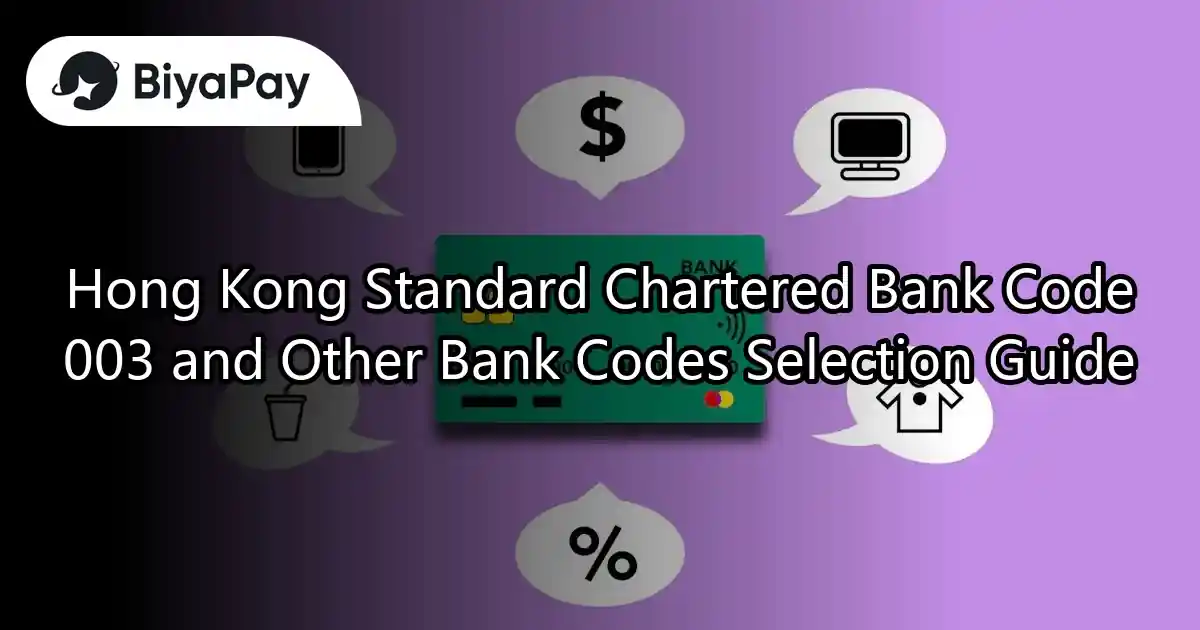- EasyCard
- Trade
- Help
- Announcement
- Academy
- SWIFT Code
- Iban Number
- Referral
- Customer Service
- Blog
- Creator
Hong Kong Standard Chartered Bank Code 003 and Other Bank Codes Selection Guide

Image Source: pexels
In Hong Kong, the 003 bank code is exclusive to Standard Chartered Bank. Each bank has a unique code, with HSBC using 004 and Bank of China using 012. When transferring or receiving funds, entering the wrong bank code could result in funds being sent to the wrong account or even lost. For example, if a customer enters the 003 bank code but selects a different bank name, the transaction may fail, affecting financial security.
Key Points
- Each Hong Kong bank has a unique bank code, with Standard Chartered Bank using the 003 code, and correctly entering the bank code ensures fund safety.
- When transferring or receiving funds, both the bank code and account number must be provided to avoid misdirected funds or transaction failures.
- Different banks have varying fees and services, and you should consider financial needs and cost-effectiveness when choosing a bank code.
- Digital account opening and branch codes improve transaction efficiency, and users should verify all bank details to prevent errors.
- Cross-border transfers require the bank code, SWIFT code, and branch details to ensure timely fund arrival and avoid returns.
003 Bank Code and Major Bank Codes

Image Source: unsplash
Standard Chartered Bank 003 Code
Standard Chartered Bank is one of the major banks in Hong Kong’s banking system. The 003 bank code is exclusive to Standard Chartered Bank. This code plays a vital role in various financial transactions. When users perform local transfers or receive funds, the banking system automatically identifies Standard Chartered Bank based on the 003 bank code. This reduces the risk of funds being sent to the wrong bank.
The 003 bank code is used not only for personal accounts but also for corporate accounts.
Standard Chartered Bank has multiple branches in Hong Kong. Each branch also has a unique branch code. When filling in bank details, users must provide both the 003 bank code and the correct branch code. This ensures funds are accurately directed to the designated account.
Other Major Bank Codes
Other major Hong Kong banks also have exclusive bank codes. These codes help the banking system quickly identify different banks. The table below lists several common Hong Kong banks and their bank codes:
| Bank Name | Bank Code |
|---|---|
| HSBC | 004 |
| Hang Seng Bank | 024 |
| Bank of China | 012 |
| Bank of East Asia | 015 |
| Standard Chartered Bank | 003 |
HSBC uses 004 as its bank code. Hang Seng Bank uses 024. Bank of China’s bank code is 012. Each bank code is unique. These codes are essential in scenarios like transfers, receiving funds, and account opening.
The importance of bank codes is evident in several aspects:
- When users perform transfers via online banking or mobile apps, they must enter the correct bank code.
- Companies use bank codes to identify recipient banks when distributing salaries or processing supplier payments.
- Bank codes help prevent funds from being sent to the wrong account, ensuring user fund safety.
Tip: When filling in bank details, double-check the bank code to avoid transaction failures or delays due to errors.
Uses of Bank Codes
Transfers and Receiving Funds
Bank codes play a critical role in local transfers and receiving funds. Whenever users make transfers via online banking or mobile apps, the system automatically identifies the recipient bank based on the entered bank code. For example, when entering the 003 bank code, the system directs funds to a Standard Chartered Bank account. This reduces the risk of funds being sent to the wrong bank.
Many Hong Kong banks require users to provide both the bank code and account number when filling in recipient details. This practice enhances transaction accuracy and ensures fund safety.
Tip: Before transferring, double-check the bank code and account number to avoid delays or losses due to errors.
Account Opening and Branch Codes
When opening an account, banks require applicants to provide branch codes. Branch codes help banks accurately allocate account information, ensuring funds are directed to the correct branch. In recent years, digital account opening has become mainstream.
- Post-pandemic, deposits at physical branches of many Hong Kong banks dropped by 50%, counter withdrawals fell by 36%, but transfer transaction volumes increased by 60%.
- The proportion of transfers via the Bank of Communications app surged by 231%, and online account openings accounted for 80% of total account openings.
- During the pandemic, First Commercial Bank saw a 55% increase in digital channel transaction customers, with double-digit growth in both digital account openings and transaction volumes.
These data show that digital account opening and branch code applications have effectively increased customer usage and transaction volumes.
Additionally, some banks have introduced self-service kiosks and facial recognition technology, enhancing security and service efficiency. These innovations, combined with branch codes, make account opening more convenient.
SWIFT and Cross-Border Services
When users need to make cross-border transfers, both bank codes and SWIFT codes are equally important. The SWIFT code is a set of codes used for international bank identification. Hong Kong banks require SWIFT codes and bank codes when processing USD or other foreign currency transfers.
The CHATS system is used for local high-value instant payments, and bank codes are also essential in this system.
Note: For cross-border transfers, ensure the recipient bank’s SWIFT code, bank code, and branch details are correct to avoid fund delays or returns.
Advantages and Limitations of 003 Bank Code

Image Source: pexels
Applicable Scenarios
The 003 bank code of Standard Chartered Bank plays a significant role in various financial scenarios. When users perform local transfers via online banking or mobile apps, the system automatically recognizes the 003 bank code, ensuring funds are correctly directed to Standard Chartered Bank accounts. Corporate users use this code when setting up standing instructions. This allows for regular automatic transfers, facilitating daily financial management.
Many Hong Kong banks support automated financial services. Standard Chartered Bank’s online platform and mobile app offer simple operations, allowing users to complete most transactions by entering the bank code and account number. These advantages make the 003 bank code a common choice for personal and corporate financial management.
Tip: When setting up standing instructions, double-check the bank code to avoid funds being transferred to the wrong account due to errors.
Fees and Service Differences
Different banks have varying fee structures for CHATS USD interbank transfers. The table below compares the fees of several major Hong Kong banks (calculated at 1 USD ≈ 7.8 HKD):
| Bank Name | CHATS USD Interbank Transfer Fee (USD) |
|---|---|
| Standard Chartered Bank | 25 |
| HSBC | 30 |
| Hang Seng Bank | 28 |
| Bank of China | 25 |
Standard Chartered Bank’s 003 bank code users face fees at a medium market level for CHATS USD transfers. Some banks adjust fees based on transaction amounts or customer tiers.
Some users may encounter delays or data mismatches during interbank transfers. It’s recommended to carefully verify bank codes, branch codes, and account numbers when filling in details. If funds do not arrive, contact bank customer service to check transaction status.
Note: Cross-border transfers involve multiple banking systems, and data errors may lead to fund returns or additional fees.
Bank Code Selection Advice
Individual Users
Individual users should choose bank codes based on their daily financial needs. If you frequently use online banking or mobile apps for local transfers, Standard Chartered Bank’s 003 bank code offers stable transfer services. HSBC (004) and Hang Seng Bank (024) also provide diverse financial tools. Some banks offer low or no-fee promotions, suitable for students or early-career individuals.
Individual users are advised to compare online service features and fee structures of different banks before opening an account to choose the bank code that best suits their needs.
Corporate Users
For corporate users handling salary payments, supplier payments, and cross-border operations, choosing the right bank code is particularly important. Standard Chartered Bank’s 003 bank code supports automated batch transfers, ideal for businesses with regular high-value transactions. Bank of China (012) and Bank of East Asia (015) have advantages in cross-border services and multi-currency accounts. Companies should select bank codes based on business scale, transaction frequency, and international business needs.
Companies can consult bank representatives to understand different banks’ corporate service packages and USD interbank transfer fees to maximize cost-effectiveness.
Scenario-Based Suggestions
The choice of bank code affects transaction efficiency and costs in different scenarios.
- Local Transfers: The 003 bank code, 004, or 024 are all suitable, depending on user requirements for service speed and fees.
- Cross-Border Transfers: Choose banks with SWIFT codes and international networks, such as Bank of China or Standard Chartered Bank, and pay attention to USD exchange rates and related fees.
- Account Opening: Individuals and companies should choose bank codes based on branch locations, online services, and customer support.
Tip: Always verify bank codes and branch codes when filling in bank details to reduce the risk of fund delays or errors.
When choosing a bank code, users should make decisions based on actual financial needs.
- Different bank codes have different services and fees.
- Users should carefully verify bank codes and branch codes.
- Pay attention to each bank’s features and advantages.
Using bank codes correctly enhances fund safety and transaction efficiency. Every user should choose the most suitable bank code based on their circumstances.
FAQ
What is a bank code, and what is its purpose?
A bank code is a unique identifier for each Hong Kong bank. It helps accurately identify the recipient bank during transfers, receiving funds, or account opening, ensuring fund safety.
How is Standard Chartered Bank’s 003 code different from other bank codes?
Standard Chartered Bank exclusively uses the 003 code. HSBC uses 004, and Bank of China uses 012. Entering the wrong code may result in funds being sent to the wrong account or transaction failure.
Is it enough to provide only the bank code for transfers?
No. Both the bank code and account number must be provided. In some cases, the branch code is also required. This ensures funds are correctly directed to the recipient’s account.
What information is needed for cross-border transfers?
For cross-border transfers, banks require the bank code, SWIFT code, recipient account number, and branch details. Correct details prevent fund delays or returns.
How are CHATS USD transfer fees calculated?
Fees vary by bank. For example, Standard Chartered Bank charges about 25 USD per CHATS USD transfer, while HSBC charges about 30 USD. Actual fees depend on exchange rates and bank policies.
Standard Chartered’s 003 bank code, alongside other Hong Kong bank codes, ensures reliable local transfers and account openings, but how can you achieve cost-effective global fund mobility and investments? BiyaPay offers an all-in-one financial platform, enabling seamless trading of US and Hong Kong stocks without offshore accounts, complementing Standard Chartered’s local services with global opportunities.
Supporting USD, HKD, and 30+ fiat and digital currencies, real-time exchange rate tracking guarantees cost transparency, while global remittances to 190+ countries feature transfer fees as low as 0.5%, with swift delivery, significantly below the typical $25 CHATS fees of traditional banks, meeting the needs of global wealth management. A 5.48% annualized yield savings product, with no lock-in period, ensures flexible fund management and enhanced returns. Sign up for BiyaPay today to integrate Standard Chartered’s 003 code reliability with BiyaPay’s global financial solutions, creating an efficient, secure wealth management experience!
*This article is provided for general information purposes and does not constitute legal, tax or other professional advice from BiyaPay or its subsidiaries and its affiliates, and it is not intended as a substitute for obtaining advice from a financial advisor or any other professional.
We make no representations, warranties or warranties, express or implied, as to the accuracy, completeness or timeliness of the contents of this publication.




Contact Us
Company and Team
BiyaPay Products
Customer Services
is a broker-dealer registered with the U.S. Securities and Exchange Commission (SEC) (No.: 802-127417), member of the Financial Industry Regulatory Authority (FINRA) (CRD: 325027), member of the Securities Investor Protection Corporation (SIPC), and regulated by FINRA and SEC.
registered with the US Financial Crimes Enforcement Network (FinCEN), as a Money Services Business (MSB), registration number: 31000218637349, and regulated by FinCEN.
registered as Financial Service Provider (FSP number: FSP1007221) in New Zealand, and is a member of the Financial Dispute Resolution Scheme, a New Zealand independent dispute resolution service provider.




















